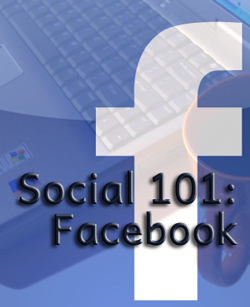 There are few things that frustrate social media users more than changes to Facebook, unless it’s when Facebook relaxes its rules to give us more freedom. Then the collective voices rise up and thank Facebook for finally seeing the light. In many cases - such as the cover photo changes in March - the big announcements about the good changes leave us scratching our heads as to why certain restrictions were ever implemented in the first place.
There are few things that frustrate social media users more than changes to Facebook, unless it’s when Facebook relaxes its rules to give us more freedom. Then the collective voices rise up and thank Facebook for finally seeing the light. In many cases - such as the cover photo changes in March - the big announcements about the good changes leave us scratching our heads as to why certain restrictions were ever implemented in the first place.
There’s always a reason, even if it’s not obvious to us. Which is why I’m personally frustrated at the lack of any critical thinking and questioning in this latest change to Facebook’s long-held rules about contests and promotions. We strongly believe it’s better for businesses to follow the guidelines because it’s just not worth the risk to lose your page over a contest or any other reasons.
Not when the rules are so easy to follow. That’s why we’ve covered promotion guidelines extensively in the past. And here we are talking about the latest changes that were announced yesterday as well. Instead of quoting the news release, let’s look at what the newly revised guidelines say:
What are you responsible for?
1. If you use Facebook to communicate or administer a promotion (ex: a contest or sweepstakes), you are responsible for the lawful operation of that promotion, including:
a. The official rules;
b. Offer terms and eligibility requirements (ex: age and residency restrictions); and
c. Compliance with applicable rules and regulations governing the promotion and all prizes offered (ex: registration and obtaining necessary regulatory approvals)
This addition is a good move by Facebook, which was necessary now that they’ve pulled the third-party app restriction. Every jurisdiction has different regulations for running contests and the onus should be on the contest owner to abide by the regs where they are. Facebook cannot realistically police that. Having rules for a contest seems like a basic starting place, but we’ve all seen contests that are haphazardly run and the business hasn’t carefully considered various challenges that in many cases could have been foreseen with a little preparation and forethought.
What must your promotions include?
2. Promotions on Facebook must include the following:
a. A complete release of Facebook by each entrant or participant.
b. Acknowledgement that the promotion is in no way sponsored, endorsed or administered by, or associated with, Facebook.
This is the clause that every page owner needs to pay very close attention to. If I post a picture of a gift certificate to my Facebook page and tell my fans “Like this to win!”, how are these requirements fulfilled? More than likely, that status would have to be expanded to:
Like this to win!
By liking this photo, you release…<insert appropraite release text legalese>
This promotion is in no way sponsored, endorsed or administered by, or associated with, Facebook. You are providing your information to <insert business> and not to Facebook.
It’s a mouthful, isn’t it?
Where can promotions be administered?
3. Promotions may be administered on Pages or within apps on Facebook. Personal Timelines must not be used to administer promotions (ex: “share on your Timeline to enter” or “share on your friend’s Timeline to get additional entries” is not permitted).
I noted in a couple of places that it’s being reported that shares are allowed as entry mechanisms. This clause says they aren’t and the reason why is likely that shares aren’t viewable unless they’re public. So, if I share something from a page on my personal timeline to friends only, that share shows up in the share count, but the page admin can’t see that I shared it - so how can they draw my name? Share contests have always bothered me more than any other kind of “illegal” Facebook contest for this reason.
This does not mean you can’t ask fans to share the contest - it just means that a share cannot count as an entry.
Who will administer your promotion?
4. We will not assist you in the administration of your promotion, and you agree that if you use our service to administer your promotion, you do so at your own risk.
Facebook still wants the legal acknowledgement that they aren’t involved, and if you weren’t clear that they want to stay arms length, they’re telling you outright that they will not get involved. You’re using a tool they’ve provided free of monetary charge to promote your business and you’re on your own when it comes to that contest you want to run, regardless of the issues you run into.
Stay tuned…
Many are praising this change as being a great money-saving change for small businesses. I agree…mostly. Tomorrow, we’ll share initial thoughts about the changes and some advice for businesses that want to run contests.


